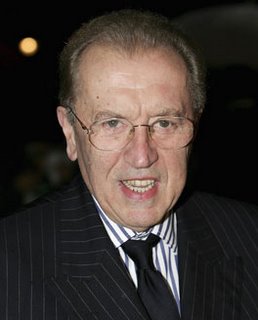Al Jazeera Invades The US...


Al That Jaz!Why Is David Frost Joining Al Jazeera, Network Bush Almost Bombed? And Why Might Nightline’s Dave Marash, Others Sign Up As Well? Freedom, Resources, Plus Massive, Somewhat Fascinating Audience
By Rebecca Dana
Riz Khan, former host of the CNN talk show Q&A, shocked his friends when he told them that he was taking a job with the fledgling Washington bureau of the Arabic news network, Al Jazeera.
Especially Colin Powell and George H. W. Bush.
“I think they were a bit surprised when they asked what I was doing next and I said, ‘I’m helping set up Al Jazeera International,’” he said. “I saw the expression on their faces, you know, were curious. I explained it was a fantastic opportunity to communicate with a part of the world we’ve lost touch with.”
He said he told them: “This is an opportunity to put senior U.S. officials in front of Arab viewers.” Then, he added, “Both of them seemed to have a much more positive attitude after that.”
Mr. Khan continued: “The administration seems to have turned around and realized that, actually, the prospect of an English-language channel broadcast internationally is an interesting one. People I meet from the State Department, from elsewhere, are far more keen to engage.”
Al Jazeera signifies many things to many American television viewers—most of them bad. It is “Osama Television” to the Bush administration, a Qatar-based broadcast network precariously endowed by the tiny nation’s benevolent dictator.
It shows indulgent montages of graphic violence and welcomes guests with strong anti-American and anti-Zionist politics. It counts Mr. bin Laden as one of its more reliable freelance personalities. Former star correspondent Tayseer Alouni was recently sentenced to seven years in prison by a court in Madrid for collaborating with Al Qaeda. And according to a British tabloid report last week, in April 2004, another friend of Mr. Powell and the elder Mr. Bush—the current President, George W. Bush—was just barely dissuaded from bombing the bejeezus out of Al Jazeera’s headquarters in Doha.
All of which would seem to make the planned March 2006 launch of an English-language version of Al Jazeera—not a translation of the Arabic original, but an entirely unique network staffed by native speakers and broadcast for a worldwide audience—a curious business decision.
Except for one thing: Western viewers may be leery of the brand name, but some of the Western world’s most accomplished broadcast journalists see the new network as a last, great hope.
“What makes Al Jazeera International different, and therefore that much more appealing to us, is that if you’re interested in doing international news, there aren’t that many choices,” said Mr. Khan. “There’s the BBC and CNN. But for those of us who want to do international news on a day-to-day basis, there’s just not that much out there.”
Among those attracted to the promise of foreign bureaus and nearly limitless resources is Dave Marash, a former Nightline correspondent and onetime anchor of WCBS New York, who is negotiating a job in the Washington bureau, according to sources close to the journalist. David Frost, the veteran BBC journalist and the first to interview Richard Nixon after Watergate, signed on earlier this summer. Former Nightline anchor Ted Koppel had a meeting with a representative from Al Jazeera International in Washington this fall, according sources close to Mr. Koppel. But nothing came of it.
Mr. Marash couldn’t be reached for comment; Mr. Koppel declined an interview request through his assistant; and Mr. Frost didn’t return several calls.
Rebecca Lipkin, a former London-based Nightline producer, joined Al Jazeera International earlier this year as the executive producer for programming out of the London bureau. She jumped not out of any frustration with broadcast news, she said, but because of the opportunity to work for a network that will allow her to produce long pieces about parts of the world that the broadcast and cable news networks don’t cover well—or don’t cover at all.
“If you told somebody at one of the networks that you want to put 20 minutes on the air about Central Asia, they would say you’re crazy,” she said. “I think this network would say, ‘Well, let’s think about this.’”
CONTINUED1 2 3 NEXT
Link Here




0 Comments:
Post a Comment
<< Home